LettertoaBstudent课文原文
letter to a b student ppt课件

comcomplex
adj. 1)复杂的,难懂的,费解的 2)复合的
n. 1)建筑群 2)不正常的精神状态,情结(对某事)不正常的忧虑
Collocation: complexness n. complexly adv.
hew(hewed; hewn或hewed) v. 1) to make or shape sth. large by cutting砍成,劈成 2)To adhere or conform strictly; hold坚持或严格地遵守
e.g. Roughly hewn timber frames粗劈成的木架子
尽管社会阶层和教育背景相同但是人们都由相同的物质构成都有同样的恐惧感和欢愉感同样的痛苦感和成就感这些共通的感受把他们连为一体
letter to a b student
question
What is the writer's view concerning social labels?
Social labels are, on the one hand, irrelevant and misleading, and on the other hand, necessary in a complex society.
hew sth. away / off
e.g. hew of dead branches
hew sth. out
e.g. hew out a career for oneself
knit(knited, knit; knitting)
v. to join closely;unite securely 编织,针织,机织,使紧密相连;牢固地联结 e.g. She's knitting herself a sweater. 她正在给自己织毛线衫。 knit stockings out of wool用毛线织袜 knit bricks together砌砖 knit one's brows皱眉
Unit_11_Letter_to_a_B_student
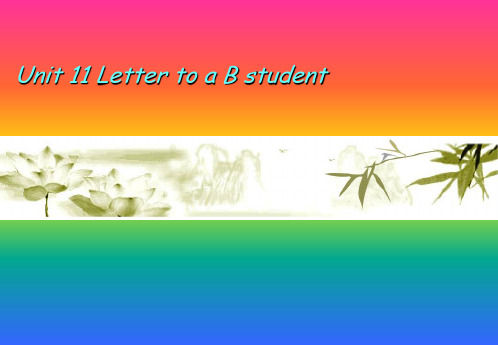
精选课件
16
Structural analysis
Paragraph 1
— introduction
Paragraphs 2 – 5
— purpose of writing: to put your disappointment in perspective by considering exactly what your grade means and doesn’t mean
精选课件
15
Text analysis
The text is a letter to a B student. In the letter the author analyzes what the grade means and doesn’t mean, and tells the student the way we should regard grades. In the end the author illustrates the importance of learning and gives encouragement to the student.
Vocabulary quiz
f____ not clear
h___ disposition, temperament
r____ fixed ways of doing things
f____ to visit frequently
r____ to feel bitter or indignant at
mark/score/grade 学分
Major 主修课
individual study自习
Minor 辅修课
school discipline 校纪
综合教程2 Unit7 Letter to a B student
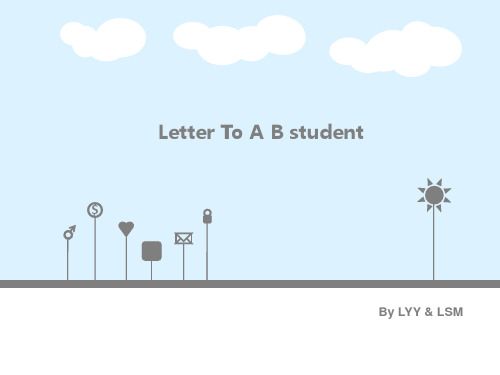
$
Text comprehension
★ To lose, to fail, to go under, to go broke… in the future.
Paraphrase:
Being unsuccessful in one’s life and career and financially disadvantaged is regarded as shameful or even sinful because in this world people tend to think that only those who are successful now can be saved from evil in the fu失tu利re失. 败,倾家荡产是很可怕的过错,因为在当今世界,人们认
Each of the seven deadly sins has an opposite among corresponding seven holy virtues. In parallel order to the sins, the seven holy virtues are humanity, charity, chastity, patience, temperance, kindness and diligence.
considering it in relation to other things
正确对待
take sth at face value : to accept sth for what Piat raappgerarasp h 3
$
Text comprehension
★ Lacking more precise meassurement tools,we must interpret your B …… mastery of the subject.
Letter to a B student 课文原文

Letter to a B studentYour final grade for the course is B. A respectable grade. Far superior to the "Gentleman's C" that served as the norm a couple of generations ago. But in those days A's were rare: only two out of twenty-five, as I recall. Whatever our norm is, it has shifted upward, with the result that you are probably disappointed at not doing better. I'm certain that nothing I can say will remove that feeling of disappointment, particularly in a climate where grades determine eligibility for graduate school and special programs.Disappointment. It's the stuff bad dreams are made of: dreams of failure, inadequacy, loss of position and good repute. The essence of success is that there's never enough of it to go round in a zero-sum game where one person's winning must be offset by another's losing, one person's joy offset by another's disappointment. You've grown up in a society where winning is not the most important thing—it's the only thing. To lose, to fail, to go under, to go broke—these are deadly sins in a world where prosperity in the present is seen as a sure sign of salvation in the future. In a different society, your disappointment might be something you could shrug away. But not in ours.My purpose in writing you is to put your disappointment in perspective by considering exactly what your grade means and doesn't mean. I do not propose to argue here that grades are unimportant. Rather, I hope to show you that your grade, taken at face value, is apt to be dangerously misleading, both to you and to others.As a symbol on your college transcript, your grade simply means that you have successfully completed a specific course of study, doing so at a certain level of proficiency. The level of your proficiency has been determined by your performance of rather conventional tasks: taking tests, writing papers and reports, and so forth. Your performance is generally assumed to correspond to the knowledge you have acquired and will retain. But this assumption, as we both know, is questionable; it may well be that you've actually gotten much more out of the course than your grade indicates—or less. Lacking more precise measurement tools, we must interpret your B as a rather fuzzy symbol at best, representing a questionable judgment of your mastery of the subject.Your grade does not represent a judgment of your basic ability or of your character. Courage, kindness, wisdom, good humor—these are the important characteristics of our species. Unfortunately they are not part of our curriculum. But they are important: crucially so, because they are always in short supply. If you value these characteristics in yourself, you will be valued—and far more so than those whose identities are measured only by little marks on a piece of paper. Your B is a price tag on a garment that is quite separate from the living, breathing human being underneath.The student as performer; the student as human being. The distinction is one we should always keep in mind. I first learned it years ago when I got out of the service and went back to college. There were a lot of us then: older than the norm, in a hurry to get our degrees and move on, impatient with the tests and rituals of academic life. Not an easy group to handle.One instructor handled us very wisely, it seems to me. On Sunday evenings in particular, he would make a point of stopping in at a local bar frequented by many of the GI-Bill students. There he would sit and drink, joke, and swap stories with men in his class, men who had but recently put away their uniforms and identities: former platoon sergeants, bomber pilots, corporals, captains, lieutenants, commanders, majors—even a lieutenant colonel, as I recall. They enjoyed his company greatly, as he theirs. The next morning he would walk into class and give these same men a test. A hard test. A test on which he usually flunked about half of them. Oddly enough, the men whom he flunked did not resent it. Nor did they resent him for shifting suddenly from a friendly gear to a coercive one. Rather, they loved him, worked harder and harder at his course as the semester moved along, and ended up with a good grasp of his subject—economics. The technique is still rather difficult for me to explain; but I believe it can be described as one in which a clear distinction was made between the student as classroom performer and the student as human being.A good distinction to make. A distinction that should put yourB in perspective—and your disappointment.Perspective. It is important to recognize that human beings, despite differences in class and educational labeling, are fundamentally hewn from the same material and knit together by common bonds of fear and joy, suffering and achievement. Warfare, sickness, disasters, public and private—these are the larger coordinates of life. To recognize them is to recognize that social labels are basically irrelevant and misleading. It is true that these labels are necessary in the functioning of a complex society as a way of letting us know who should be trusted to do what, with the result that we need to make distinctions on the basis of grades, degrees, rank, and responsibility. But these distinctions should never be taken seriously in human terms, either in the way we look at others or in the way we look at ourselves.Even in achievement terms, your B label does not mean that you are permanently defined as a B achievement person. I'm well aware that B students tend to get B's in the courses they take later on, just as A students tend to get A's. But academic work is a narrow, neatly defined highway compared to the unmapped rolling country you will encounter after you leave school. What you have learned may help you find your way about at first; later on you will have to shift to yourself, locating goals and opportunities in the same fog that hampers us all as we move toward the future.。
Unit7 letter to A B student.ppt
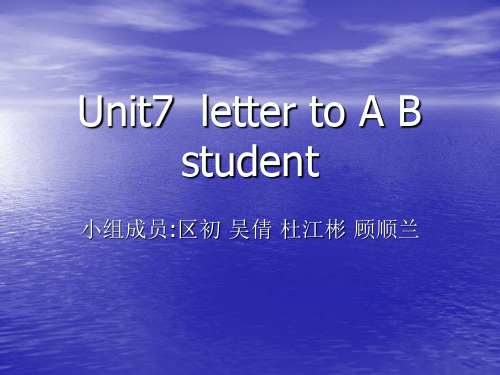
• 试译:我认识他已经三年了。 • 正: I have known him for three
years .
• 误:I have recognized him for
three years
vocabulary
(P9/l2) Hew
• 1.to cut sth large with a tool wood 劈,砍(大的物
Unit7 letter to A B student
小组成员:区初 吴倩 杜江彬 顾顺兰
• (p9/L1) recognize和know的区别 • know 意为“认识”,可以表示认识或熟悉某人,
也可以只表示认识某人是谁(即认识某人是什么 样子),它不仅可以用于人,也可以用于地方等。
•
而recognize 意为“认得出”,表示能认出曾见过 或原来认识的人或物。应注意:recognize 是终止 性动词,其完成时不能同表示一段时间的状语连 用。
• N.1a large basket with a lid ,especially one used to carry
体)
• To hew wood砍木头 • 2.to make or shape sth large by cutting 砍成,劈
出(某种形状,某物)
• Roughly hewn timber frames粗劈成的木架子 • Eg: The statues were hewn out of solid rock.这
fog filter雾镜;雾化滤片;雾化滤光镜 dense fog大雾;迷雾;浓雾;重雾 Radiation fog辐射雾;放射雾;平流辐射雾
• (P10/l7) • Hamper • V.to prevent sb from easily doing or achieving sth 妨碍,
Letter to a B student

我。
• resent英 [r ɪ'zent] 美 [rɪˈzɛnt] vt. 对 …感到愤怒; 怨恨; 愤恨; 厌恶 v. 憎恨,生气
• resentment n. 怨恨,愤恨 • resentful a. 不满的 • resentfulness n. 怨恨,愤恨
• 客观性。它是很重要去辨别人类的,尽管社会阶级和教育背 景不同,但是人们都由相同的物质构成,被恐惧和快乐、 痛苦和成就就这些人类共同的纽带联系在一起。承认这一 点非常重要。战争、疾病、公共灾难,私人困难----这些都 是生活中的更大坐标集合。
谢谢观看! 2020
• n. 编织物; 编织法 • Knit Fabric针织物 • e例子:1:I had endless hours to knit and
sew.
• 我有无数的时间ห้องสมุดไป่ตู้缝缝补补。
• coordinate英 [kəʊ'ɔ:dɪneɪt] 美 [ko'ɔrdəˈnet] • vt. 使协调,使调和; 整合 • vi. 协调; 协同; 成为同等 • adj. 同等的; [语法学]并列的; 同等级的 • n. <数>坐标; (颜色协调的)配套服装 • coordinate frame坐标系 coordinate geometry几
translation
• 奇怪的是,挂掉的那些人也不会讨厌他。他们也不会厌恶 他身份的变化,从一个友善的朋友变成严酷的老师。相反 他们喜欢他所以会在他的课上不断努力学习,最终学期结 束的时候很好的掌握这门课程经济学。这样的 教 书 技巧 我 都无法 解释清楚,但我相信,他很好的区分了学生们 的身份,作为教室里的学习者和单纯的人类身份。这样的 区分客观的判断了你的失望与你得到的B.
英语专业课本及习题电子版 Letter to A B student
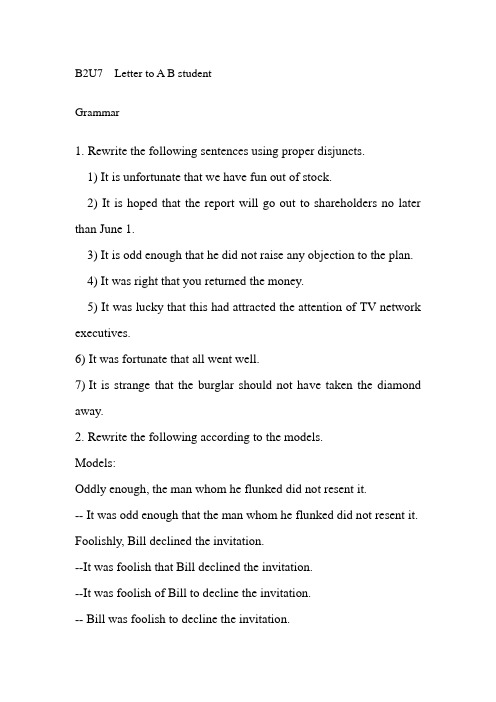
B2U7 Letter to A B studentGrammar1.Rewrite the following sentences using proper disjuncts.1) It is unfortunate that we have fun out of stock.2) It is hoped that the report will go out to shareholders no later than June 1.3) It is odd enough that he did not raise any objection to the plan.4) It was right that you returned the money.5) It was lucky that this had attracted the attention of TV network executives.6)It was fortunate that all went well.7)It is strange that the burglar should not have taken the diamond away.2.Rewrite the following according to the models.Models:Oddly enough, the man whom he flunked did not resent it.-- It was odd enough that the man whom he flunked did not resent it. Foolishly, Bill declined the invitation.--It was foolish that Bill declined the invitation.--It was foolish of Bill to decline the invitation.-- Bill was foolish to decline the invitation.1)Rightly, they protested against it.2)Foolishly, the boy didn't say a single word.3)Wisely, John sent the man away.4)Sadly, the storm destroyed the entire tobacco crop.5)Remarkably, Mrs Jesen consulted her lawyer.6)Regrettably, James refuses to speak.7)Thankfully, my assistant has arranged for the matter to be considered by an ad hoc working party.8)Hopefully, a proposal will be ready in time for our next meeting.3.Fill in each blank with a proper relative word. Use "preposition + relative word" if necessary.1)Good writing is built on a solid framework of logic, argument, narrative, or motivation______ runs through the entire piece of writing and holds it together. This is the time _____ many writers find it most effective to outline as a way of visualizing the hidden sine ______ the piece of writing is supported.2)The element _______ writers may spend a majority of their time is development.3)Mr. Ford still talks like the man ___ he was ten years ago.4)James Russell is a man ________ I have the greatest respect.5)He had many friends _______ he had a regular correspondence.6)The woman ________ he is engaged comes from Poland.7)The school ______ she id head is closing down.8)The rate _____ a material heats up depends on its chemical composition.4.Put in where, when, why, which or what.1)Barnstaple, ______ I spent my Ester holiday, has a very old covered market ________ I bought some lovely old plates.2)I could not understand _______ the speaker said, _____ irritated me.3)He could not remember ______ had happened before he lost consciousness.4)I really cannot understand _______ everybody is so excited ovr the news.5)Chain stores _______ all goods are displayed on open counters encourage shop-lifting.6)______ we went to France last year. I was astonished to find that I could still make myself understood.7)I don't know _____ you agreed to pay the account if you feel you are cheated.8)I forgot to post that letter yesterday, ______ means it won't get there till after the weekend, ____ is annoying because I had promised to let Mrs. Jacobs know _______ I would do to help her in the church bazaar.plete the following sentences with the appropriate words in the box.Whoever wherever whatever however whenever whichever1)The castle we visited last weekend is very beautiful. ______, I would not like to live there.2)__________ problem you may have, we will help.3)She has no friends _________.4)__________ you go, I will follow you.5)Take _____ book you like best.6)He offered a reward to whoever should restore the lost ring.7)________ late it is, you must come to the party because it will be something fantastic.8)I may go ______ I please. You may come ________ you please.6.Make sentences of your own after the sentences given below, keeping the parts in italics in your sentences.1)...winning is not the most important thing -- it's the only thing.2)Oddly enough, the men whom he flunked did not resent id. Nor dud they resent him...Rather, they loved him, worked harder and harder.Translation1.Translate the following sentences into Chinese.1)whatever our norm is, it has shifted upward, with the result that you are probably disappointed at not doing better.2)Lacking more precise measurement tools, we must interpret yourB as a rather fuzzy symbol at best, representing a questionable judgment of your mastery of the subject.3)It is important to recognize that human beings, despite differences in class and educational labeling, are fundamentally hewn from the same material and knit together by common bonds of fear and joy, suffering and achievement.4)But academic work is a narrow, neatly defined highway compared to the unmapped rolling country you will encounter after you leave school.2.Translate the following sentences into English, using the words and phrases given in the brackets.1)他因急性阑尾炎住院治疗,结果期末考试都没参加。
Unit 7 Letter to a B Student
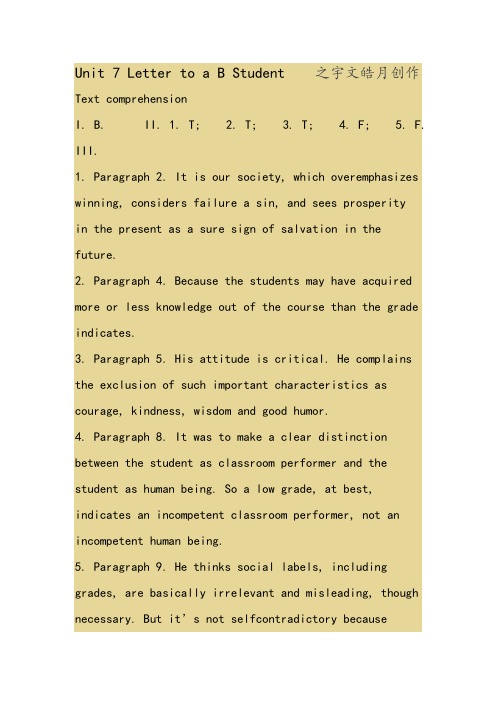
Unit 7 Letter to a B Student 之宇文皓月创作Text comprehensionI. B. II. 1. T; 2. T; 3. T; 4. F; 5. F. III.1. Paragraph2. It is our society, which overemphasizes winning, considers failure a sin, and sees prosperityin the present as a sure sign of salvation in the future.2. Paragraph 4. Because the students may have acquired more or less knowledge out of the course than the grade indicates.3. Paragraph 5. His attitude is critical. He complains the exclusion of such important characteristics as courage, kindness, wisdom and good humor.4. Paragraph 8. It was to make a clear distinction between the student as classroom performer and the student as human being. So a low grade, at best, indicates an incompetent classroom performer, not an incompetent human being.5. Paragraph 9. He thinks social labels, including grades, are basically irrelevant and misleading, though necessary. But it’s not selfcontradictory becausesocial labels are necessary as ways of distinction for job choice, not as reasons for attitude toward othersor ourselves in human terms.IV.1. Being unsuccessful and disadvantaged is regarded as sinful because in this word people tend to thinktoday’s success can save one from evil in the future. 2. It is important to see the fact that although they differ in their class status and educational background, human beings are essentially the same. Biologicallythey are constructed in the same way, and they sharethe common feelings of fear and joy and the common experience of suffering and achieving. This commonality has bound them together. All of them will regard wars, diseases, and disasters both private and public as unfortunate big events in their life time.Structural analysis of the text1. Paragraph 2—5. Key words: Disappointment. Main idea: Grades do not mean everything.2. Paragraph 6—8. Key words: The student as performer; the student as human being. Main idea: Getting a B inclass does not mean one will always be a B performer in life.3. Paragraph 9—10. Key words: Perspective. Main idea: In a complex society like ours, labels are necessary but they should be kept in perspective.Section Four Consolidation ActivitiesPart one. Vocabulary AnalysisI. Phrase practice1. essence: inner nature; indispensable quality; the most important part 实质,实质,精髓e.g. His works reflect the essence of fascism. 他的作品反映出法西斯的实质。
Letter to a B student

another 转变
e.g. The Left is shifting its ground. 左派正在改变立场。 His eyes shifted to the telephone. 他的眼光转向了电话机。
2) transfer sth. 移动,转移
e.g. In August we shifted our furniture to Dublin. 八月时我们把家具搬到了都柏林。
Part III: (Para.9-10) perspective: the way we should regard grades
A
5
far superior to:
much better in quality than
e.g.
This car is superior to that one. 这辆汽车比那辆要好。
A
16
inadequacy n. 1) being too low in quality or too small in amount
不适当, 不十分, 不完全
e.g. The inadequacy of water supply for city people has already been a problem no government can take lightly.
Grade A AB+ B B-
letter to a b student 课件

词义辨析 label,tag这两个名词均含“标签”之意。 label指上面标明货主姓名、地址及货物名称、重量、尺
寸等内容 的标签。 tag多指临时系上的标签。
整理版ppt
7
irrelevant
adj. not important to or connected with a situation
hew sth. across / through e.g. They hewed a path through the jungle.
hew sth. away / off e.g. hew of dead branches
hew sth. out e.g. hew out a career for oneself
the way we look at ourse整l理v版epspt.
2
hew(hewed; hewn或hewed) v. 1) to make or shape sth. large by cutting砍成,劈成 2)To adhere or conform strictly; hold坚持或严格地遵守
整理版ppt
8
comcomplex
adj. 1)复杂的,难懂的,费解的 2)复合的
n. 1)建筑群 2)不正常的精神状态,情结(对某事)不正常的忧虑
Collocation: complexness n. complexly adv.
词义辨析: complex,complicated,sophisticated,intricate complex侧重内在关系的复杂,需通过仔细研究与了解 才能掌握和运用。complicated与complex的含义接近, 但语气更强,着重极其复杂,很难分析、分辨或解释。 sophisticated侧重指事物发展到或达到高级的程度所体 现的复杂。intricate着重指整理错版pp综t 复杂,令人迷惑理解。9
Letter to a B student(paragraph7~8)ppt课件

Derivative
Coerce
v. 强迫,迫使
Coercion n. 强迫,胁迫
Coercively adv. 强制地,压迫地
.
Make a point of doing sth.
to be or make sure you do sth. because it is important or necessary e.g.: I made a point of closing all the windows before leaving the house.
Unit7 Letter to a B Student
Paragraph7~8
.
One instructor handled us very wisely, it seems to me. On Sunday evening in particular, he would make a point of stopping in at a local bar frequented by many of the GI-Bill student. There he would sit and drink, joke, and swap stories with men in his class, men who had but recently put away their uniforms and identities: former platoon sergeant, bomber pilots, corporals, captains, lieutenants, commanders, majors——even a lieutenant colonel, as I recall. They enjoyed his company greatly, as he theirs. The next morning he would walk into class and give these same men a test. A hard test. A test on which he usually flunked about half of them.
Unit 7 Letter to a B Student课文翻译综合教程二
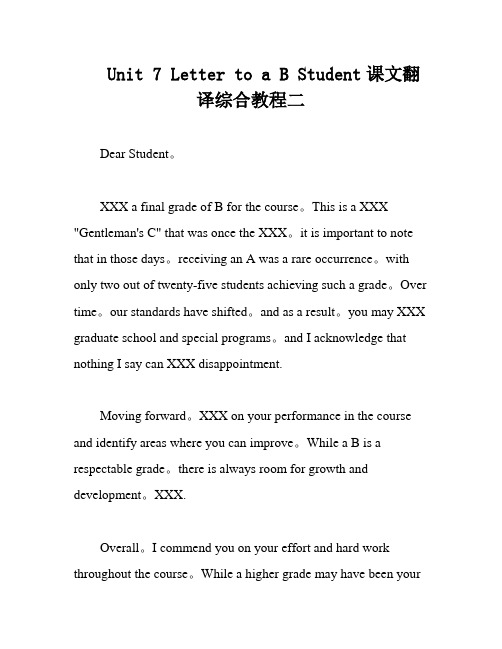
Unit 7 Letter to a B Student课文翻译综合教程二Dear Student。
XXX a final grade of B for the course。
This is a XXX "Gentleman's C" that was once the XXX。
it is important to note that in those days。
receiving an A was a rare occurrence。
with only two out of twenty-five students achieving such a grade。
Over time。
our standards have shifted。
and as a result。
you may XXX graduate school and special programs。
and I acknowledge that nothing I say can XXX disappointment.Moving forward。
XXX on your performance in the course and identify areas where you can improve。
While a B is a respectable grade。
there is always room for growth and development。
XXX.Overall。
I commend you on your effort and hard work throughout the course。
While a higher grade may have been yourgoal。
it is XXX grades do not define your worth as a student or individual。
Letter to a b student PPT
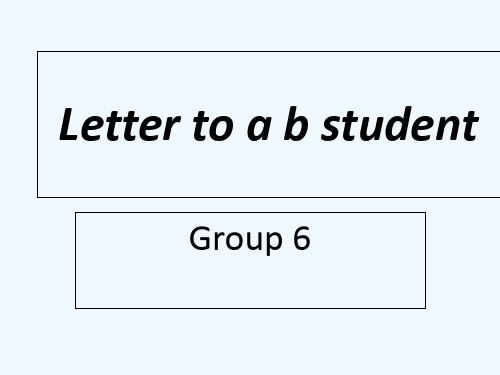
• coordinate英 [kəʊ'ɔ:dɪneɪt] 美 [ko'ɔrdəˈ net]
• vt. 使协调,使调和; 整合 • vi. 协调; 协同; 成为同等 • adj. 同等的; [语法学]并列的; 同等级的 • n. <数>坐标; (颜色协调的)配套服装 • coordinate frame坐标系 coordinate
的看着我。
• resent英 [r…感到愤怒; 怨恨; 愤恨; 厌恶 v. 憎恨, 生气
• resentment n. 怨恨,愤恨 • resentful a. 不满的 • resentfulness n. 怨恨,愤恨 • e.g. He resents that he is
• get into gear开动机器
• e.g. With protective gear on you can spar with a partner. 戴上护具后可以和 对手练习轻拳出击
• Coercive: 英 [kəʊˈɜ:sɪv] 美 [koʊˈɜ:rs ɪv] adj. 强制的,强迫的; 高压的
• …他突然从友善的样子变成严酷的模样。
• It is important to recognize that human beings, despite differences in class and educational labeling, are fundamentally hewn from same material and knit together by common bonds of fear and joy, suffering and achievement. Warfare, sickness, disasters public and private-these are the larger coordinates of life .
Unit 7 Letter to a B Student课文翻译综合教程二

Unit 7 Letter to a B Student课文翻译综合教程二Unit 7 Letter to a B StudentDear B Student,I hope this letter finds you well. As your fellow classmate, I wanted to take a moment to commend you on your academic achievements. While some may view a B grade as average or even subpar, I genuinely believe that it represents a level of dedication and hard work that should not go unnoticed.In a competitive learning environment, such as ours, it is easy to become fixated on achieving perfect scores or being at the top of the class. However, I believe that success should not be solely defined by academic achievements, but rather by personal growth, perseverance, and the pursuit of knowledge.Throughout our time together in this course, I have witnessed your dedication and commitment to your studies. Your consistent B grades reflect your ability to grasp and apply the concepts taught in class. Your participation in discussions and willingness to ask questions have not only enriched your own learning experience, but that of your peers as well.Being a B student is not a mark of failure, but rather a testament to your willingness to learn and grow. It signifies that you are actively engaging with the course material, putting in the effort, and making progress. Often, it is the B students who possess a deep understanding of the subject matter, asthey have taken the time to truly comprehend the material, rather than merely memorizing facts.I believe that academic success is not limited to achieving top grades, but encompasses a range of skills and qualities that will benefit you in the long run. Your ability to balance your academic commitments with other aspects of your life, such as extracurricular activities, personal relationships, and self-care, is admirable. It demonstrates a well-rounded approach to education and a recognition of the importance of maintaining a healthy work-life balance.While your grades may not always reflect the effort you put in or the knowledge you possess, it is important to remember that they do not define your worth as a student or as an individual. Your commitment to your education and the skills you have developed along the way are far more valuable than a letter grade on a piece of paper.Continue to embrace the challenges that come your way, for it is through these challenges that we truly grow. Keep up the excellent work and remember that being a B student is nothing to be ashamed of. In fact, it is something to be proud of.Wishing you continued success and growth,Your Fellow Classmate。
LettertoaBStudentPPT

• A change in the money supply brings a corresponding change in expenditure.
哄她,她就会安静的。 • The meeting dissolved in ill ~. 不欢而
散
Frequent [v.]
• Tourists frequent the old temple at the suburbs of the city.
• Many foreign ships frequent the new port.
Word Differentiation
• She retained her tennis title for the third year.
• The stunt man swayed the long pole to retain the balance.
• The roads around the town have been very poorly maintained.
• Reading aloud (page 152) • Getting to know the new words • Word derivation • Word differentiation
Norm [n.]
• Europe’s varied cultural, political and ethical norms(an accepted standard or way of behavior or doing things that most people agree with 规范,标准,准则)
九上《出使函》课文原文

九上《出使函》课文原文
> Book 9, Lesson 1: "A Letter of Goodwill"
亲爱的朋友,
我代表我们学校的师生,向你们表示最诚挚的问候和祝福。
非常荣幸能够写下这封信,与你们分享我们的友谊和合作之道。
通过今天的信件,我们希望能够加强我们学校与你们学校之间的联系,促进双方的交流与合作。
我们坚信,教育的力量可以携手改善我们世界的未来。
首先,我想表达我们对你们学校的敬意和赞赏。
你们在教育事业上的努力和成就深深地打动了我们。
我们对你们学校在学术方面的卓越表现表示钦佩,并希望能够与你们一起共同探索教育的更多可能。
同时,我们诚挚地邀请你们学校的师生来访我们学校。
我们希望通过交流和互学,增进双方的了解和友谊。
我们将为你们的来访
提供最好的支持和接待,以确保你们在我们学校的经历愉快而富有收获。
此外,我们也愿意与你们学校共同举办一些教育活动或项目,以促进双方学生之间的互动和合作。
我们相信这样的合作将对我们学校的教育质量提升和学生的全面发展产生积极的影响。
最后,让我们一起努力,为教育事业贡献我们的力量。
让我们携手合作,为实现教育的目标而努力奋斗,为培养更多有才华、有担当的青年人而努力奋斗。
衷心希望我们的友谊与合作能够长久持续,成为两校师生共同的宝贵财富。
期待着你们的回信。
我们敬祝,
问候
[你的名字]
时间: [日期]
地点: [学校名]
联系方式: [联系方式]。
LettertoaBstudent课文原文

LettertoaBstudent课⽂原⽂Letter to a B studentYour final grade for the course is B. A respectable grade. Far superior to the "Gentleman's C" that served as the norm a couple of generations ago. But in those days A's were rare: only two out of twenty-five, as I recall. Whatever our norm is, it has shifted upward, with the result that you are probably disappointed at not doing better. I'm certain that nothing I can say will remove that feeling of disappointment, particularly in a climate where grades determine eligibility for graduate school and special programs.Disappointment. It's the stuff bad dreams are made of: dreams of failure, inadequacy, loss of position and good repute. The essence of success is that there's never enough of it to go round in a zero-sum game where one person's winning must be offset by another's losing, one person's joy offset by another's disappointment. You've grown up in a society where winning is not the most important thing—it's the only thing. To lose, to fail, to go under, to go broke—these are deadly sins in a world where prosperity in the present is seen as a sure sign of salvation in the future. In a different society, your disappointment might be something you could shrug away. But not in ours.My purpose in writing you is to put your disappointment in perspective by considering exactly what your grade means and doesn't mean. I do not propose to argue here that grades are unimportant. Rather, I hope to show you that your grade, taken at face value, is apt to be dangerously misleading, both to you and to others.As a symbol on your college transcript, your grade simply means that you have successfully completed a specific course of study, doing so at a certain level of proficiency. The level of your proficiency has been determined by your performance of rather conventional tasks: taking tests, writing papers and reports, and so forth. Your performance is generally assumed to correspond to the knowledge you have acquired and will retain. But this assumption, as we both know, is questionable; it may well be that you've actually gotten much more out of the course than your grade indicates—or less. Lacking more precise measurement tools, we must interpret your B as a rather fuzzy symbol at best, representing a questionable judgment of your mastery of the subject.Your grade does not represent a judgment of your basic ability or of your character. Courage, kindness, wisdom, good humor —these are the important characteristics of our species. Unfortunately they are not part of our curriculum. But they are important: crucially so, because they are always in short supply. If you value these characteristics in yourself, you will be valued—and far more so than those whose identities are measured only by little marks on a piece of paper. Your B is a price tag on a garment that is quite separate from the living, breathing human being underneath.The student as performer; the student as human being. The distinction is one we should always keep in mind. I first learned it years ago when I got out of the service and went back to college. There were a lot of us then: older than the norm, in a hurry to get our degrees and move on, impatient with the tests and rituals of academic life. Not an easy group to handle.One instructor handled us very wisely, it seems to me. On Sunday evenings in particular, he would make a point of stopping in at a local bar frequented by many of the GI-Bill students. There he would sit and drink, joke, and swap stories with men in his class, men who had but recently put away their uniforms and identities: former platoon sergeants, bomber pilots, corporals, captains, lieutenants, commanders, majors—even a lieutenant colonel, as I recall. They enjoyed his company greatly, as he theirs. The next morning he would walk into class and give these same men a test. A hard test. A test on which he usually flunked about half of them. Oddly enough, the men whom he flunked did not resent it. Nor did they resent him for shifting suddenly from a friendly gear to a coercive one. Rather, they loved him, worked harder and harder at his course as the semester moved along, and ended up with a good grasp of his subject—economics. The technique is still rather difficult for me to explain; but I believe it can be described as one in which a clear distinction was made between the student as classroom performer and the student as human being.A good distinction to make. A distinction that should put yourB in perspective—and your disappointment.Perspective. It is important to recognize that human beings, despite differences in class and educational labeling, are fundamentally hewn from the same material and knit together by common bonds of fear and joy, suffering and achievement. Warfare, sickness, disasters, public and private—these are the larger coordinates of life. To recognize them is to recognize that social labels are basically irrelevant and misleading. It is true that these labels are necessary in the functioning of a complex society as a way of letting us know who should be trusted to do what, with the result that we need to make distinctions on the basis of grades, degrees, rank, and responsibility. But these distinctions should never be taken seriously in human terms, either in the way we look at others or in the way we look at ourselves.Even in achievement terms, your B label does not mean that you are permanently defined as a B achievement person. I'm well aware that B students tend to get B's in the courses they take later on, just as A students tend to get A's. But academicwork is a narrow, neatly defined highway compared to the unmapped rolling country you will encounter after you leave school. What you have learned may help you find your way about at first; later on you will have to shift to yourself, locating goals and opportunities in the same fog that hampers us all as we move toward the future.。
- 1、下载文档前请自行甄别文档内容的完整性,平台不提供额外的编辑、内容补充、找答案等附加服务。
- 2、"仅部分预览"的文档,不可在线预览部分如存在完整性等问题,可反馈申请退款(可完整预览的文档不适用该条件!)。
- 3、如文档侵犯您的权益,请联系客服反馈,我们会尽快为您处理(人工客服工作时间:9:00-18:30)。
Letter to a B studentYour final grade for the course is B. A respectable grade. Far superior to the "Gentleman's C" that served as the norm a couple of generations ago. But in those days A's were rare: only two out of twenty-five, as I recall. Whatever our norm is, it has shifted upward, with the result that you are probably disappointed at not doing better. I'm certain that nothing I can say will remove that feeling of disappointment, particularly in a climate where grades determine eligibility for graduate school and special programs.Disappointment. It's the stuff bad dreams are made of: dreams of failure, inadequacy, loss of position and good repute. The essence of success is that there's never enough of it to go round in a zero-sum game where one person's winning must be offset by another's losing, one person's joy offset by another's disappointment. You've grown up in a society where winning is not the most important thing—it's the only thing. To lose, to fail, to go under, to go broke—these are deadly sins in a world where prosperity in the present is seen as a sure sign of salvation in the future. In a different society, your disappointment might be something you could shrug away. But not in ours.My purpose in writing you is to put your disappointment in perspective by considering exactly what your grade means and doesn't mean. I do not propose to argue here that grades are unimportant. Rather, I hope to show you that your grade, taken at face value, is apt to be dangerously misleading, both to you and to others.As a symbol on your college transcript, your grade simply means that you have successfully completed a specific course of study, doing so at a certain level of proficiency. The level of your proficiency has been determined by your performance of rather conventional tasks: taking tests, writing papers and reports, and so forth. Your performance is generally assumed to correspond to the knowledge you have acquired and will retain. But this assumption, as we both know, is questionable; it may well be that you've actually gotten much more out of the course than your grade indicates—or less. Lacking more precise measurement tools, we must interpret your B as a rather fuzzy symbol at best, representing a questionable judgment of your mastery of the subject.Your grade does not represent a judgment of your basic ability or of your character. Courage, kindness, wisdom, good humor—these are the important characteristics of our species. Unfortunately they are not part of our curriculum. But they are important: crucially so, because they are always in short supply. If you value these characteristics in yourself, you will be valued—and far more so than those whose identities are measured only by little marks on a piece of paper. Your B is a price tag on a garment that is quite separate from the living, breathing human being underneath.The student as performer; the student as human being. The distinction is one we should always keep in mind. I first learned it years ago when I got out of the service and went back to college. There were a lot of us then: older than the norm, in a hurry to get our degrees and move on, impatient with the tests and rituals of academic life. Not an easy group to handle.One instructor handled us very wisely, it seems to me. On Sunday evenings in particular, he would make a point of stopping in at a local bar frequented by many of the GI-Bill students. There he would sit and drink, joke, and swap stories with men in his class, men who had but recently put away their uniforms and identities: former platoon sergeants, bomber pilots, corporals, captains, lieutenants, commanders, majors—even a lieutenant colonel, as I recall. They enjoyed his company greatly, as he theirs. The next morning he would walk into class and give these same men a test. A hard test. A test on which he usually flunked about half of them.Oddly enough, the men whom he flunked did not resent it. Nor did they resent him for shifting suddenly from a friendly gear to a coercive one. Rather, they loved him, worked harder and harder at his course as the semester moved along, and ended up with a good grasp of his subject—economics. The technique is still rather difficult for me to explain; but I believe it can be described as one in which a clear distinction was made between the student as classroom performer and the student as human being.A good distinction to make. A distinction that should put yourB in perspective—and your disappointment.Perspective. It is important to recognize that human beings, despite differences in class and educational labeling, are fundamentally hewn from the same material and knit together by common bonds of fear and joy, suffering and achievement. Warfare, sickness, disasters, public and private—these are the larger coordinates of life. To recognize them is to recognize that social labels are basically irrelevant and misleading. It is true that these labels are necessary in the functioning of a complex society as a way of letting us know who should be trusted to do what, with the result that we need to make distinctions on the basis of grades, degrees, rank, and responsibility. But these distinctions should never be taken seriously in human terms, either in the way we look at others or in the way we look at ourselves.Even in achievement terms, your B label does not mean that you are permanently defined as a B achievement person. I'm well aware that B students tend to get B's in the courses they take later on, just as A students tend to get A's. But academic work is a narrow, neatly defined highway compared to the unmapped rolling country you will encounter after you leave school. What you have learned may help you find your way about at first; later on you will have to shift to yourself, locating goals and opportunities in the same fog that hampers us all as we move toward the future.。
